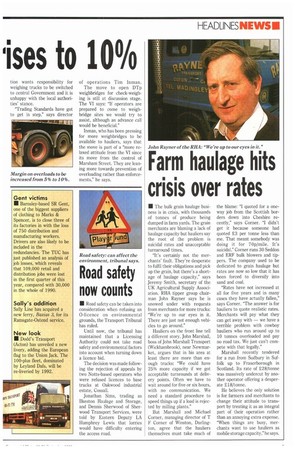arm haulage hits crisis over rates
Page 7

If you've noticed an error in this article please click here to report it so we can fix it.
• The bulk grain haulage business is in crisis, with thousands of tonnes of produce being dumped in farm yards. The grain merchants are blaming a lack of haulage capacity but hauliers say the root of the problem is suicidal rates and unacceptable turnaround times.
"It's certainly not the merchants' fault. They're desperate to fulfil their obligations and pick up the grain, but there's a shortage of haulage capacity," says Jeremy Smith, secretary of the UK Agricultural Supply Association. RHA tipper group chairman John Rayner says he is snowed under with requests from merchants for more trucks: "We're up to our eyes in it. There are just not enough vehicles to go around."
Hauliers on the front line tell a different story. John Marshall, boss of John Marshall Transport (Wickhambrook), near Newmarket, argues that in his area at least there are more than enough trucks: "We could have 25% more capacity if we got acceptable turnrounds at delivery points. Often we have to wait around for five or six hours, with no communication. We need a standard procedure to speed things up if a load is rejected by milling plants."
But Marshall and Michael Corner, managing director of T F Corner of Winston, Darlington, agree that the hauliers themselves must take much of the blame: "I quoted for a oneway job from the Scottish borders down into Cheshire recently," says Corner. "I didn't get it because someone had quoted £3 per tonne less than me. That meant somebody was doing it for 7 Op/mile. It's suicidal" Corner runs 30 Seddon and ERF bulk blowers and tippers. The company used to be dedicated to grain haulage but rates are now so low that it has been forced to diversify into sand and coal.
"Rates have not increased at all for five years and in many cases they have actually fallen," says Corner. The answer is for hauliers to quote realistic rates. Merchants will pay what they can get away with — we have a terrible problem with cowboy hauliers who run around up to 10 tonnes overloaded and pay no road tax. We just can't compete with that legally."
Marshall recently tendered for a run from Sudbury in Suffolk up to Fraserborough in Scotland. Its rate of g28/tonne was massively undercut by another operator offering a desperate E18/tonne.
He believes the only solution is for farmers and merchants to change their attitude to transport by treating it as an integral part of their operation rather than an annoying extra expense. "When things are busy, merchants want to use hauliers as mobile storage capacity," he says.




























































































